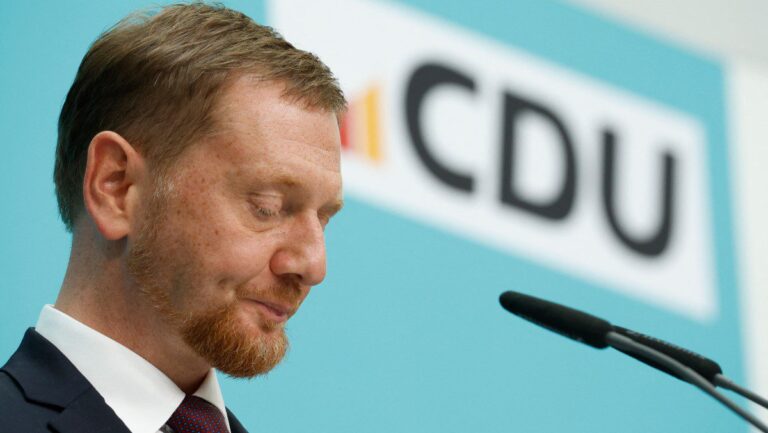The UK and France signed an agreement November 14th to coordinate on methods to stop illegal migrants, often aided by people smugglers, from reaching British shores.
The deal, envisioned to be in force across multiple years, is projected to cost €72.2 million and includes a 40% increase (from 250 to 350) in the number of British-funded French officers for patrolling French beaches in the next five months, the BBC reports.
Under the policy, British officers will also be embedded in French-led control rooms and on the ground with their counterparts for the first time to improve coordination and information sharing. Paris had previously resisted calls to have British immigration officers in France.
The agreement will increase investment in surveillance technology, drones, detection dog teams, CCTV, and helicopters, as well as support for reception and removal centers in France for migrants whose journeys are intercepted.
The announcement comes after last week’s meeting between British PM Rishi Sunak and French President Emmanuel Macron, where they disclosed their countries were preparing such a document.
This year alone, using small boats, more than 40,000 people have crossed the Channel to southern Britain, up from 28,526 last year. This is the highest number since these figures began to be collected in 2018. The newly appointed Prime Minister Rishi Sunak and interior minister Suella Braverman had been under severe pressure to bring a solution to the complex issue.
Only late last month, Braverman said Britain faced an “invasion,” a statement thrown into sharp relief by an overcrowded migrant processing center in Kent. While speaking to Parliament, the minister (who had been reappointed by Sunak merely six days after her resignation over a minor breach of protocol), called for all to “stop pretending they are all refugees in distress, the whole country knows that is not true.”
After having met her French counterpart Gerald Darmanin in Paris, where she signed the deal, Braverman said, “it is in the interests of both the UK and French governments to work together to solve this complex problem.”
Just after arriving in Bali for the G20 summit, Sunak expressed confidence that “we can get the numbers down but I also want to be honest with people that there isn’t a single thing that will magically solve this. We can’t do it overnight.”
Labour leader Sir Keir Starmer called the deal a “small step in the right direction,” but said more needed to be done to tackle people smuggling.
Franck Dhersin, the mayor of Téteghem-Coudekerque-Village near Dunkirk (a hotspot for migrants attempting a crossing), has expressed doubts over whether the deal might yield much success. In an interview on BBC Radio 4’s Today programme, he noted that “we are talking here about 175 km of beach and dunes where it is very easy to hide,” and that, as a consequence, “not all police officers can permanently devote themselves because it would be to the detriment of the normal work of the police in the city.”
In his view, when stopped, migrants will just try again, since they “don’t want to stay in France, 90% want to go across the Channel,” because “they have an uncle, a brother, a sister, a member of family in England.”
Dhersin’s statements hint at a dynamic currently at work in much of the West. Migration by an initial few will invariably develop into much larger movements of people who seek reunification with their loved ones—an understandable human instinct to be sure but, when paired with the inducement relatively prosperous nations hold, leads to an irrevocable demographic change within respective nations. If left unchecked, this trend—in the absence of a healthy respect for, if not adoption of the host nation’s culture—could lead to social and cultural fracture.
Many Albanians are behind the recent surge of the migrant population in the UK. Making use of Britain’s modern slavery laws (which include any form of human trafficking, slavery, servitude, or forced labour), they claim to be victims of trafficking in order to avoid deportation.
British government figures released this month showed the number of modern slavery referrals was at its highest ever in the third quarter of this year. Albanians made up 28% of all 4,586 claims. The figures went on to show that Albanians made up 42% of migrants traveling on small boats between May and September of this year, with just over 11,000 Albanians arriving during that time. Last year, the number stood at 800, 75% of which were men aged 18 to 39.
Explaining the “exponential” rise, Clandestine Channel Threat Commander Dan O’Mahoney told the Home Affairs Select Committee last week, that it is “in the main due to the fact that Albanian criminal gangs have gained a foothold in the north of France.”
Apart from whether the deal will prove a success or not, it does signal a warming up of Macron to the UK, in contrast to recent years of relations strained by a Boris-led Brexit and former PM Liz Truss’ inopportune questioning whether Macron was friend or foe during her Tory leadership campaign last August.





